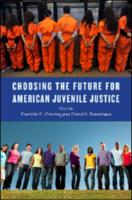Choosing the Future for American Juvenile Justice
Contributor(s)
Zimring, Franklin E. (editor)
Tanenhaus, David S. (editor)
Language
EnglishAbstract
This is a hopeful but complicated era for those with ambitions to reform the juvenile courts and youth-serving public institutions in the United States. As advocates plea for major reforms, many fear the public backlash in making dramatic changes. Choosing the Future for American Juvenile Justice provides a look at the recent trends in juvenile justice as well as suggestions for reforms and policy changes in the future. Should youth be treated as adults when they break the law? How can youth be deterred from crime? What factors should be considered in how youth are punished?What role should the police have in schools? This essential volume, edited by two of the leading scholars on juvenile justice, and with contributors who are among the key experts on each issue, the volume focuses on the most pressing issues of the day: the impact of neuroscience on our understanding of brain development and subsequent sentencing, the relationship of schools and the police, the issue of the school-to-prison pipeline, the impact of immigration, the privacy of juvenile records, and the need for national policies—including registration requirements--for juvenile sex offenders. Choosing the Future for American Juvenile Justice is not only a timely collection, based on the most current research, but also a forward-thinking volume that anticipates the needs for substantive and future changes in juvenile justice.
Keywords
Crime and criminology; Family law: childrenDOI
10.18574/nyu/9781479816873.001.0001ISBN
9781479863402, 9781479816873, 9781479863402, 9781479863402Publisher
New York University PressPublication date and place
New York, 2014Imprint
NYU PressSeries
Youth, Crime, and Justice, 5Classification
Crime and criminology
Family law: children


 Download
Download Download
Download